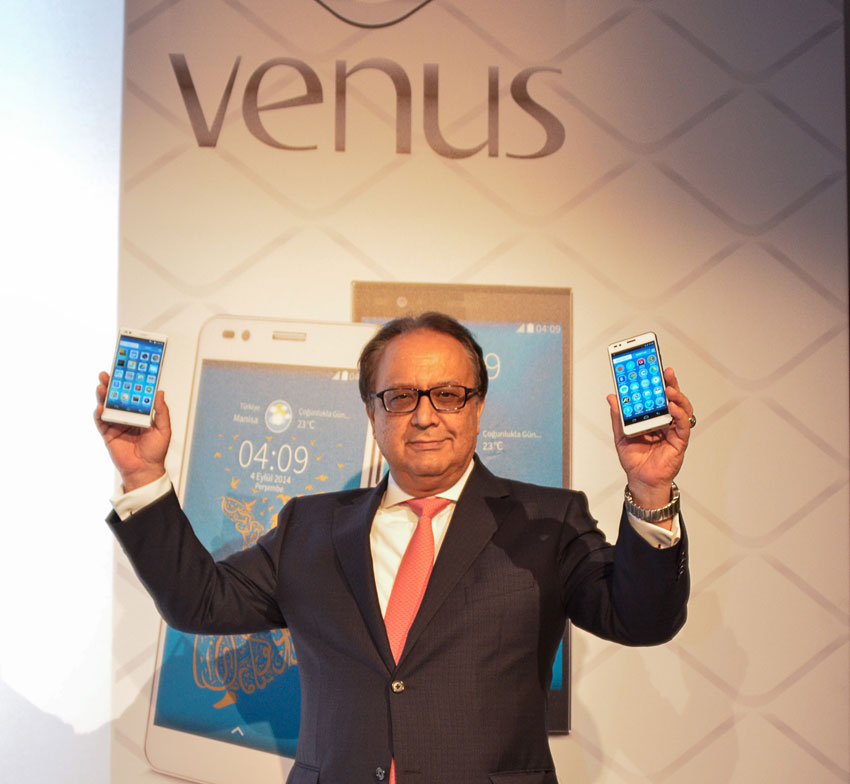With a visionary CEO and a new smartphone making waves across Turkey and beyond, Vestel is fast emerging as a global superpower in technology and electronics capable of competing with the established global market leaders.

In a corner of western Turkey where the Aegean Sea kisses a coastline touched by many of the great civilizations of antiquity, a technological revolution is quietly underway led by Vestel group.
The ancient coastal city of Manisa is the centre of production for the Vestel Venus, Turkey’s first domestically produced smartphone.
“With its stylish design and advanced technology that hold their own against global brands, our smartphone, Venus, demonstrates Vestel’s commitment to developing and manufacturing high-tech products,” Vestel Group CEO Turan Erdogan had said at an unveiling in September 2014 in Berlin.
Turkish engineers at the sprawling Vestel City complex within Manisa developed the Android-based Venus and three million are expected to be produced annually by the end of 2017, with one million exported, mainly to Europe.
Vestel is already one of Europe’s leading manufacturers of TVs, with the capacity to produce 15 million sets annually and occupying 20% of the European market. Mr Erdogan said smartphones were the logical next step for his ambitious group.
“The total TV market worldwide is roughly 250 million sets, whilst the mobile phone and smartphones market is 1.2 billion pieces. Even in Turkey, the total phones market is about 14 million pieces whereas the TV market is only 3.5 million. This means we are entering a new market 5 times bigger than the TV market,” he explained.
“In Europe, no one is manufacturing smartphones. I think Europe is missing this digital revolution. America, Korea, Japan, Taiwan, and China are centres for manufacturing smartphones, but we have not seen this happening in Europe so far,” Mr Erdogan added.
The forward-thinking CEO has overseen the establishment of new departments and the hiring of new engineers and staff to help create Turkey’s smartphone revolution.
“For a new company, it is difficult to enter this market. However, for Vestel, a company that has 20 years of experience in the manufacturing industry, it is easy.”
When it was launched at the end of Q3 2014, the standout features of the Venus 5.5” were its 13-megapixel camera, 16GB hard drive, and 4G LTE and NFC technologies. A cheaper model, the Venus 5.0”, was presented as desirable for its long battery life.
Mr Erdogan pointed out that the price of the Venus was less than half that of many of its competitors, with the 5.5” initially selling in Turkey for around $410 and the 5.0” at $295.
Aware that the smartphone market does not stand still, Vestel intends to introduce a new Venus model every six months. In Q3 2015, the new model will include a 13.8-megapixel camera system and thickness of less than 7mm.
“We are going to present a range from very affordable but very advanced phones, to very fancy-looking, prestigious products,” Mr Erdogan said.
Despite being a market leader in electronics and white goods in Europe, the Vestel name is little known outside of its native Turkey and neighboring countries due to the fact that it produces most of its appliances for other brands and retail chains.
Pointing out that Samsung and Sony also started out by manufacturing TVs and white goods, Mr Erdogan sees vast potential in merging Vestel’s expertise and product lines to create a range of “smart appliances”.
“At Vestel, we have the ability to make electronics and to put them into white goods to make them smart and connect them to the internet. It was not our choice; we cannot afford not to manufacture smartphones, smart televisions, smart refrigerators, and smart air conditioning,” he said.
Mr Erdogan would like to enter more markets across its product range with Vestel’s own brand name, but he is eyeing a technological breakthrough from his well-financed R&D team before doing so.
“Entering markets with our own brand is a costly procedure, but if we can come up with some kind of technological breakthrough, like Apple did, it is much more feasible. The touchscreen, for example, was available ten years before Apple used it, but they were the first guys to think that touch control can be used in a mobile phone. These kind of things make a brand name become very popular in a very short time.”
Vestel is one of only three Turkish companies in the global list of the top 1000 corporate R&D spenders and the group values ideas above everything else.
“We have to seek out the next big ideas because we are in the midst of the digital revolution. It is not about making it, but thinking of it. If somebody comes up with a genius idea, we can make it a reality. Ideas are the most valuable thing these days,” Mr Erdogan said.
0 COMMENTS